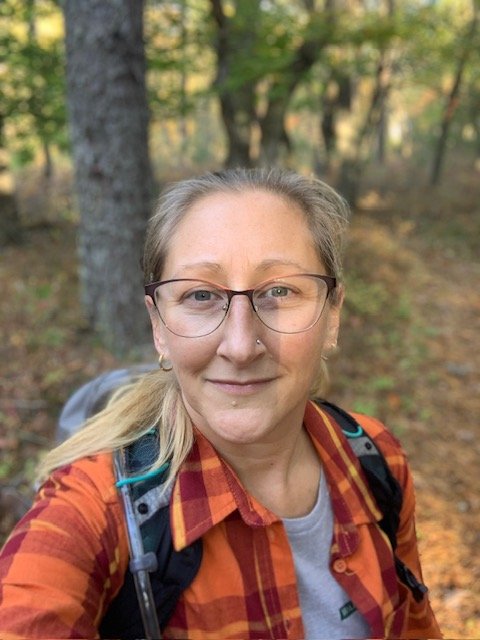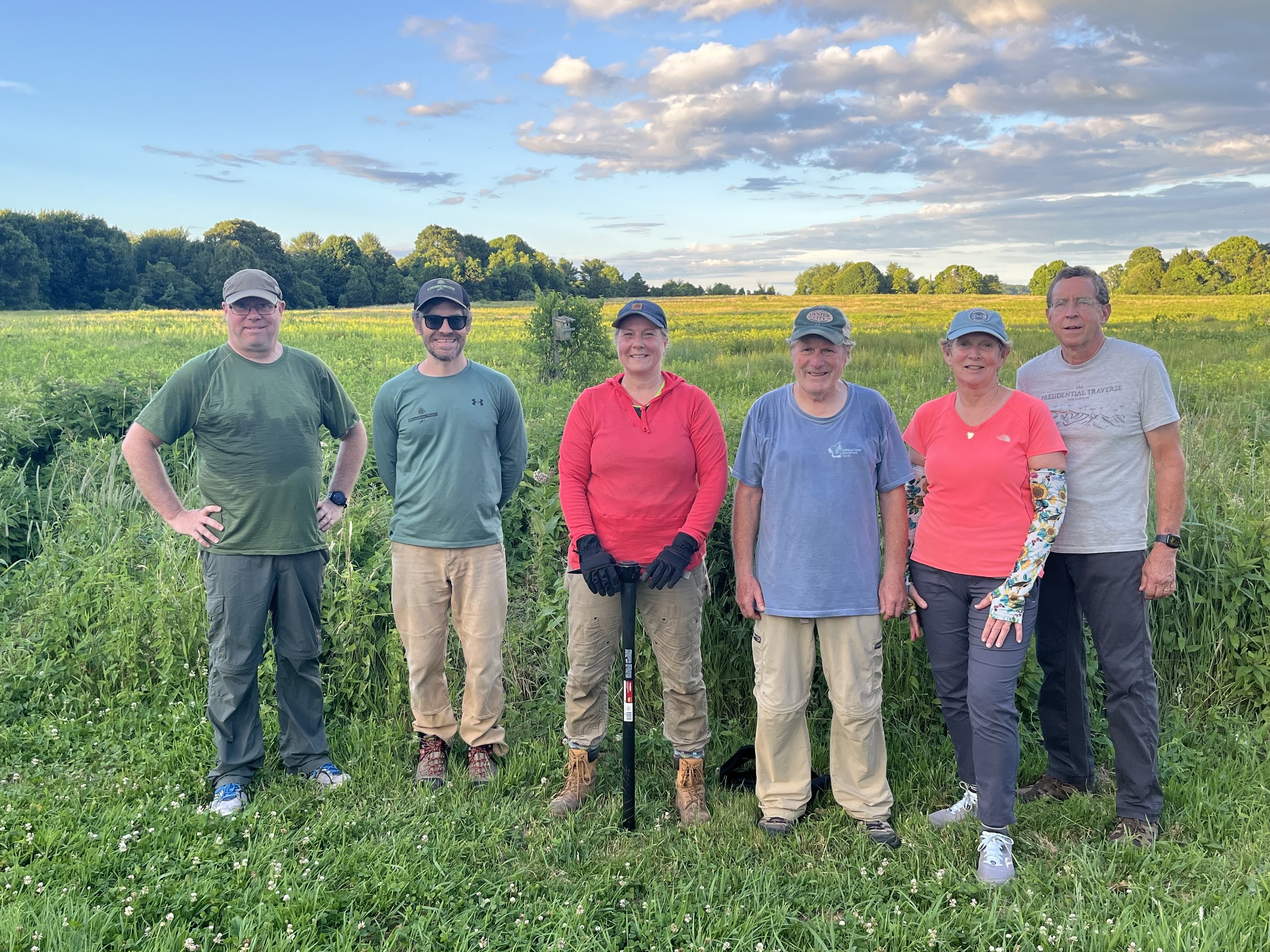If you’ve ever joined Wildlands for a guided hike, chances are you were met with the smiling face of a volunteer. Wildlands relies on friendly, knowledgeable, and trained volunteers in the communities we serve to connect new audiences with the lands we protect.
After a successful volunteer hike leader training series last winter, there are several new guides you might encounter on your next Wildlands hike. Read on to get to know all of our volunteer hike leaders. Thank you, volunteers, for the time and passion you lend to our mission!
If you would like to support Wildlands programming, please email events@wildlandstrust.org.
Janine Anderson
(She/her)
Home: Pembroke
Programs I lead: Guided hikes (mostly sweeping), Adopt-a-Preserve (Willow Brook Farm; Pudding Hill Reservation; Tucker Preserve, including Rocky Run, Ludden’s, etc.), anything involving trail building/maintaining.
Outdoor interests & hobbies: Trail building (have worked on/maintained Cross Vermont Trail for past 6 years on vacations), camping, getting young people outdoors via Girl Scouts, certified Kripalu Mindful Outdoor guide and ANFT Forest Therapy Guide, certified to use a chainsaw (it's a thing!), and Pembroke Farmers Market. I love being outdoors. I also have a full-time job in the financial services world.
Why Wildlands? When going through my divorce, I joined several Wildlands hikes, especially the "Hike & Hops." I mentioned that Tucker didn't feel safe as a single woman walking alone (it wasn't marked well at the time) and was told that I could volunteer to help "blaze" it for better navigation. I became a member, attended volunteer trail work parties (love!), and got hooked. That property is now on my regular rotation, so it is a safe place for others. My next goal is to lead more hikes for young people and families so we can all get back to nature and slow down a little—at least briefly. Wildlands is an amazing, inclusive, supportive organization that truly cares for outdoor spaces.
Mike Arsenault (he/him)
Home: Marshfield
Programs I lead: Over the years I have led/swept many hikes at Hoyt-Hall Preserve and the other Marshfield properties. I also volunteer for the Marshfield Recreational Trail Committee.
Outdoor interests & hobbies: Being outdoors is what I enjoy: hiking, fishing, photography, sports, and just plain sitting.
Why Wildlands? Hoyt-Hall Preserve is my base; this is where my involvement with Wildlands began, helping to create and maintain it.
Ann Chadwick-Dias (she/her)
Home: Originally from West Bridgewater but have lived in Carver for over 34 years
Programs I lead: Guided hikes (mostly sweeping), Adopt-a-Preserve (Halfway Pond Conservation Area), anything Wildlands asks me to do!
Outdoor interests & hobbies: Hiking, biking, paddling, birds, and overall conversation and protection of wetlands. I sit on the Carver Conservation Commission.
Why Wildlands? Steve and I used to hike at Halfway Pond and noticed the Wildlands Trust signs. We were first met by Wildlands team members Erik and Marilynn to "Adopt a Preserve." We became members, and then we started doing hikes with Malcolm MacGregor, who we miss and remember every time we step onto any trail in Plymouth. Then, we just started doing volunteer work events and other engaging programs at Wildlands Trust. We've been volunteering for 3-4+ years now and we love everything Wildlands does. It's an awesome way to contribute to the community and volunteer for an organization that is growing rapidly, overseeing conservation properties in 57 (and counting) South Shore communities.
Justin Cifello
(He/him)
Home: Grew up in Middleborough and Wareham, and now live in Bourne.
Programs I lead: Walks about plants and natural history, as well as invasive species removal and trail-building projects.
Outdoor interests & hobbies: I'm interested in all things nature, especially native plants, insects, and their intersection with human history and culture. I'm also an organic farmer.
Why Wildlands? I was first introduced to Wildlands through my workplace at Bay End Farm, which has land in conservation through the Trust. Wildlands is appealing to me because they serve the whole of Southeastern Massachusetts and have a diverse array of properties, programs, and personnel. As an avid hiker always on the hunt for a new place, Wildlands is a great local resource.
Stephen Dias
(He/him)
Home: Originally from West Bridgewater. Live in East Bridgewater. But, I love hiking and the history in Plymouth.
Programs I lead: Guided hikes (Halfway Pond Conservation Area, Indian Head River Trail, Tucker Preserve, and others), Adopt-a-Preserve (Great River Preserve and Striar Conservancy), and will be adding more this year.
Outdoor interests & hobbies: Hiking, running, biking, birds, and conservation. History of all things, particularly military and geopolitical History. I pick up trash twice a week along a very busy road. Overall interested in environmental protection.
Why Wildlands? When I stopped working full-time as a UPS driver, I really wanted to stay active and physically fit. I started hiking Wildlands properties, “adopted” a few preserves, and then started doing work projects. Volunteering with Wildlands Trust is just a win/win: being outside in nature, contributing to my community, and working with an awesome team of people.
Betsy Hall
(Any and all pronouns)
Home: Plymouth
Programs I lead: Mindful Meditation, Full Moon Hikes, trail hikes. I am also an Adopt-a-Preserve monitor for Halfway Pond Conservation Area.
Outdoor interests & hobbies: Wildlife, plants, people
Why volunteer? Because I enjoy hiking with others, introducing people to meditation nature hiking, and encouraging people to support Wildlands Trust.
Jessamyn Kennedy
(She/her)
Home: I live in Onset, MA; originally from Hudson, MA.
Programs I lead: I lead hikes with Wildlands such as the Lady Slipper Stroll, some Hike & Hops, and other general hikes.
Outdoor interests & hobbies: I enjoy studying edible plants and native flora and fauna, plus how ecosystems function and how they all relate.
Why Wildlands? I volunteer with Wildlands because I love the properties. I got involved because I used to run at Great Neck Preserve three times per week and would report trail issues through Instagram before I realized I could volunteer. I love what Wildlands does and believe strongly in the importance of conservation and wild spaces.
Debbie Leavitt
(She/her)
Home: Plymouth; I grew up in Avon.
Programs I lead: Leading and sweeping guided hikes. I also monitor South Triangle Pond Conservation Area as my “adopted” preserve. I am also interested in other volunteer opportunities with the Trust.
Outdoor interests & hobbies: Hiking, biking, kayaking, camping (backwoods and campsites), skiing (downhill and cross-country), snowshoeing, winter hiking, yoga, meditation, and reading.
Why Wildlands? I was nicknamed "the outdoor kid" by my mom growing up. At my job, I was nicknamed "nature girl" because I would go outside in any weather. I have always found such happiness and peace outdoors. When I heard about Wildlands Trust from a friend and looked into all that Wildlands does, I knew that I wanted to get involved. I love all the other programs that Wildlands Trust offers: the lecture about bats, the stargazing during the winter... So many wonderful opportunities to learn. Wildlands Trust is an ever-growing and amazing organization.
Rob MacDonald
(He/him)
Home: Hanson; originally from Randolph
Programs I lead: Guided hikes
Outdoor interests & hobbies: Wildlife, plants, natural history, cultural history, photography
Why Wildlands? I began volunteering with Wildlands Trust around 1999 and saw it as a means of contributing to the protection and care of our local wild spaces.
Dan Murphy
(He/him)
Home: Brockton
Programs I look forward to leading: Night hikes, leaf peeping, family events
Outdoor interests & hobbies: Backyard birds, walks in the woods, geocaching
Why Wildlands? I love being outdoors, enjoying the sights, sounds, and smells of nature. Wildlands Trust manages Brockton's Stone Farm Conservation Area adjacent to my home, and I got involved first in the Adopt-a-Preserve program to help out there, and recently jumped into the hike leader program.
Skip Stuck
(He/him)
Home: Sagamore Beach
Programs I lead: Full Moon Hikes, Hike & Hops, kids’ hikes, nature hikes
Outdoor interests & hobbies: Local history
Why Wildlands? I've been volunteering since I retired 9 years ago. I love virtually everything the Trust does, and they encourage me to do virtually everything I want to do.
Paul Vicino (he/him)
Home: Born and raised in Wareham, but I have called Halifax my home since 2018.
Programs I lead: I enjoy talking about the history of places I hike if known, night/full moon hikes, big gathering hikes, and themed hikes, like a Halloween hike—this is my third year leading one at Striar Conservancy. I am also an Adopt-a-Preserve volunteer at several properties and often visit properties where I am not an active steward and do work there. I also help out whenever asked if I am available.
Outdoor interests & hobbies: I enjoy playing outside and do all my cardio outdoors—hiking/walking, backpacking/camping, cross-country skiing, snowshoeing, mountain biking, and kayaking. I go to the gym and enjoy reading and watching movies.
Why Wildlands? I became a volunteer about 4.5 years ago because I was already hiking Wildlands’ properties and I wanted to give back. Now hiking and trail work have become my jam. I do trail work as I hike. I arrange trail days with Wildlands and other organizations for my co-workers. My daughters do their community service hours that are required for high school graduation by joining me on my trail work days. I enjoy sharing the trails I love by leading and sweeping on Wildlands hikes. Open space is important for a healthy community, and helping to maintain and expand it is my way of giving back. We are lucky to live in a place with so many great places to hike and explore, and I love to explore.
Brian Vigorito (he/him)
Home: Pembroke
Programs I lead: Mostly birding and naturalist walks. I am also the president of the South Shore Bird Club.
Outdoor interests & hobbies: Birds, mammals, nature photography
Why Wildlands? The Wildlands properties near my home helped spark my interest in nature, and I believe strongly in the importance of conserving land locally.
























